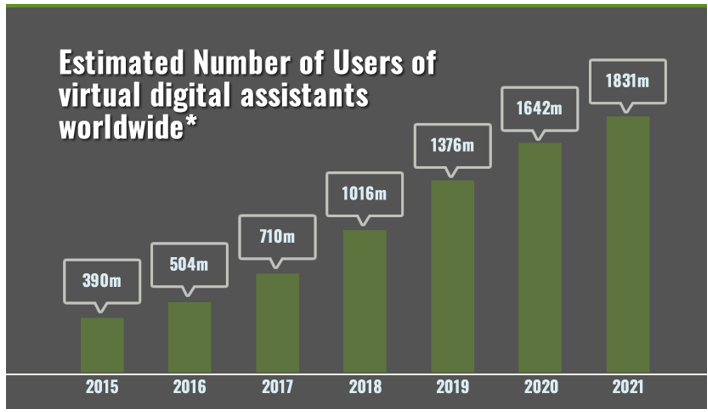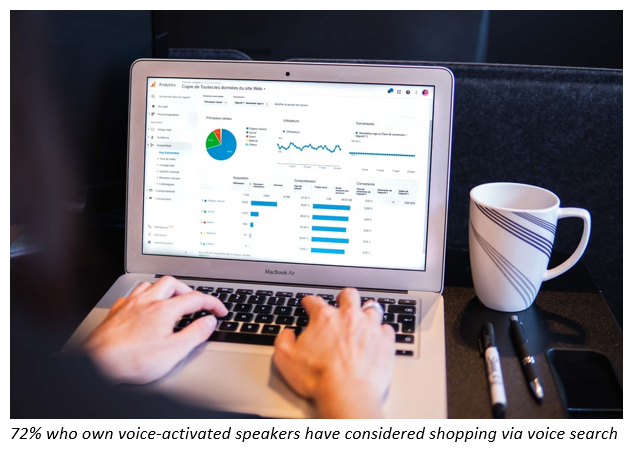 Now, the way people search on Google has switched in recent years, with several virtual assistant alternatives such as Cortana, Alexa, and Siri, and eCommerce also has transformed to a way, where customers engage, resulting in a tremendous increase in internet results. So, you might be wondering, why is voice search predicted to be the future of digital marketing? Voice search, as the name implies, refers to the use of voice search technology that allows users to conduct searches by talking directly into a device, similar to any virtual voice assistant. So, now you may order groceries, book a taxi, listen to music, and get whatever information you need using voice search.
How about learning more on voice search? Let’s see!
Now, the way people search on Google has switched in recent years, with several virtual assistant alternatives such as Cortana, Alexa, and Siri, and eCommerce also has transformed to a way, where customers engage, resulting in a tremendous increase in internet results. So, you might be wondering, why is voice search predicted to be the future of digital marketing? Voice search, as the name implies, refers to the use of voice search technology that allows users to conduct searches by talking directly into a device, similar to any virtual voice assistant. So, now you may order groceries, book a taxi, listen to music, and get whatever information you need using voice search.
How about learning more on voice search? Let’s see!
In 2021, Voice search was utilised by 58% to find a local business online
The Stirring Growth of voice search
As the ability to spot and grasp human speech patterns was still in its existence, Google introduced voice search in 2011, which was first more of a curiosity than a service that people depended on. At the time being, many of them have already developed smart assistants via smartphone apps that allow you to compose a text message using your voice. According to the study, more than half of all people have used voice search, with 25% using it in 2018 and thereafter, in 2019, Google launched BERT, an upgraded algorithm that aims to better grasp the complexities of human speech and the meaning of words in searches.
Looking at the voice search statistics, it's quite overwhelming to read through the reports because it can & it has resulted in significant e-commerce growth.
• Grocery shopping contributed over 20% of all voice-activated orders.
• Voice search is used by 55% of youngsters on a daily basis.
• In 2022, the market for voice-activated shopping is estimated to reach $40 billion.
• By 2022, consumer expenditure on voice assistants is likely to reach 18%.
• The global market for voice-activated smart speakers might be worth $30 billion by 2024.
• In the last 12 months, 60% of smartphone users have used voice search at least once.

Just looking ahead, it's been discovered that voice search has been generally accepted by the era as the voice assistants managed to give the right outputs; this isn't just a claim, but it's backed up by surveys. On the Windows 10 taskbar, voice search accounts for 25% of correct search results and so far, Google Home has come out on top, successfully answering 81% of the queries. On the other hand, Siri is in a pretty good position, with 52.3% of queries properly answered. So, based on all of these polls, we can readily see how voice search became the most popular technology of the future.
The Rapid Growth of E-Commerce in Digital marketing via Voice Search
During the last few years, voice-enabled purchasing has exploded in popularity, and it's now a game-changer. Economists expect an increase in demand for voice-driven user experiences as items become more widely available on the internet. For digital marketers, it's more than just a pastime, because, although voice searches are more conversational and natural, the semantics of search queries must be prioritised thus marketers will need to rethink the keywords they employ in their content as well as their overall marketing approach. Despite the fact that there are still a lot of significant obstacles to overcome this platform for a wider acceptance in markets, both technological and societal challenges must be taken in order to gain trends like these if you want to see a rapid growth.
Of course, voice search can tremendously increase the visibility of your targets!
Just look at how and why voice search is the new big thing in eCommerce.
• Smart speaker availability - many people own smart speakers and utilise them to make store purchases.
• More Frictionless and Interactive Customer Experience - Voice search provide a more seamless and engaging customer experience by reducing direct contact and providing a more comfortable hands-free experience.
• Provides Customised Shopping Experiences - offers tailored shopping experiences based on individual interests through the use of recommendations.
• Time-saving - Voice search is speedy and effective, allowing users to communicate quickly and effortlessly.
• Easy to Evaluate - The flexibility and comfort with which people may review things makes them more real and meaningful.

Voice search is on its approach to becoming a major retail channel, thanks to the widespread use of smart speakers and advancements in AI technologies that enhance the voice commerce experience. During the pandemic, the COVID-19 effect increased customer demand for contactless shopping options, as well as increased use of voice assistants, which provided a hands-free, interactive, and frictionless customer experience. If you really want to keep on top of the voice search trend, focus on creating useful, interesting content and staying up to current on Google's algorithm changes.






